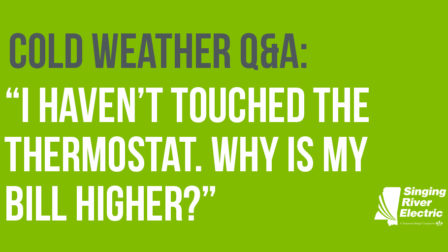
ANSWER: Power bills following periods of prolonged cold weather or extreme heat can be higher even when you have not changed the thermostat. Heating and cooling costs make up the largest percentage of a home’s energy use. When the temperature changes drastically or stays extremely hot or cold, your heating/cooling unit must run longer to keep your home at the programmed, comfortable setting.
Even the most efficient heating system set to the recommended 68 degrees sees much more use in extreme cold weather. If you have extreme cold days, or prolonged periods of very low temperatures, your heating system works harder and for longer periods to make up the difference.
- Imagine today’s temperature is a cool 50 degrees, and your unit is set to 68 degrees. The unit will run until it makes up the 18-degree difference in temperature and reaches the programmed setting.
- Now imagine a morning with a 15-degree temperature. You didn’t change your thermostat, but your system must now run longer to make up a difference of 53 degrees.
This causes your home to use more energy during this period and results in a higher power bill next month.
Also, using space heaters can increase your energy consumption because they require additional electricity to run, and traditional wood-burning fireplaces can allow heated air to escape through the chimney.
The same can happen in the summer due to extreme and prolonged heat, or other factors including pool pumps and other equipment that use more energy.
______________________________________________________________________________________
Factors Other Than Weather Can Also Impact a Power Bill
Our representatives are always ready to assist you with any question you have about your Singing River Electric billing statement. Here are some things you may consider researching before calling. It could provide answers to questions or provide valuable information when you call.
Know Your Billing and Energy Use History
Study how much power you’ve used in the last 13 months. This history is provided on your billing statement that is mailed (in the case of paperless billing, emailed) monthly. You can compare your most recent month with the last month’s energy use, and last year’s energy use. Singing River Electric members can also review energy use history and payment/billing history on the SmartHub app or on View Bill Use at singingriver.com. SmartHub is a free app that can be downloaded to any Android or Apple mobile device by visiting singingriver.com.
Check the Days of Use
Check the number of days that are billed for your electric use that month. This varies from bill to bill due to the number of days in a month and the days in a billing cycle.
Remember, Appliances Run Even When You’re Gone
If you leave your home for the day, or even an extended period of time, any appliances you leave plugged in will continue to use electricity. Water heaters, the second largest energy user in your home, join refrigerators, freezers, cable boxes, heating and cooling systems, well pumps and more that continue to run and use energy while you are away. Check your thermostat setting before you leave; your heating and cooling system will work to stay at that temperature whether you are at home or away.
Know That No Two Households Are Alike
You do not use energy the same as your neighbor, and houses are not built exactly alike, so comparing your electric bill to your neighbor’s is like comparing apples to oranges. It is best to compare your current energy use to past energy use.
Also, consider other factors:
- Did you have extra guests stay over the past month?
- Add a swimming pool?
- Welcome a college student back home?
- Adopt new hobbies that include the use of power tools, ovens or other appliances?
All of these factors and more could increase your home’s energy use and result in higher power bills.
Consider Appliance Use, Placement, and Age
Lighting, refrigeration, cooking and appliances account for a large percentage of your home’s total energy use.
- Location of refrigerators and freezers can have an impact. Never place a refrigerator or freezer in direct sunlight or in an unconditioned space such as a garage. The unit will work much harder and use more energy to overcome the excessive outdoor heat during warmer months.
- Ensure refrigerators and freezers have adequate ventilation to maintain peak efficiency.
- If an appliance is more than 15 years old, the efficiency of that appliance may be decreasing significantly. This means it is requiring more energy to do the job.
- It is important to maintain appliances to ensure they are working at peak efficiency and energy savings.
______________________________________________________________________________________
Options for Bill Payment
Here are some options for paying your Singing River Electric bill.
Multiple Payments in One Billing Period
Sometimes it helps to pay the amount in two payments within the same billing period. Pay one portion and then the remaining amount two weeks later, or prior to the due date.
Budget Billing
If your account is current and you meet the requirements, you can request to be placed on budget billing. Your monthly billing statements would then be averaged based on a 12-month average that is re-adjusted in January and July of each year. You pay the average bill and are able to budget that amount monthly to avoid sharp increases due to seasonal fluctuations in energy use.
After studying your energy use, comparing it to last year and last month, and considering the above information, if you still feel there may be a deeper problem, please call any of our three offices. Our member service representatives will be available to take your call and assist you. If a field visit is necessary, that will be scheduled after the initial call. Please note energy audits are free, but meter tests may require a fee.

